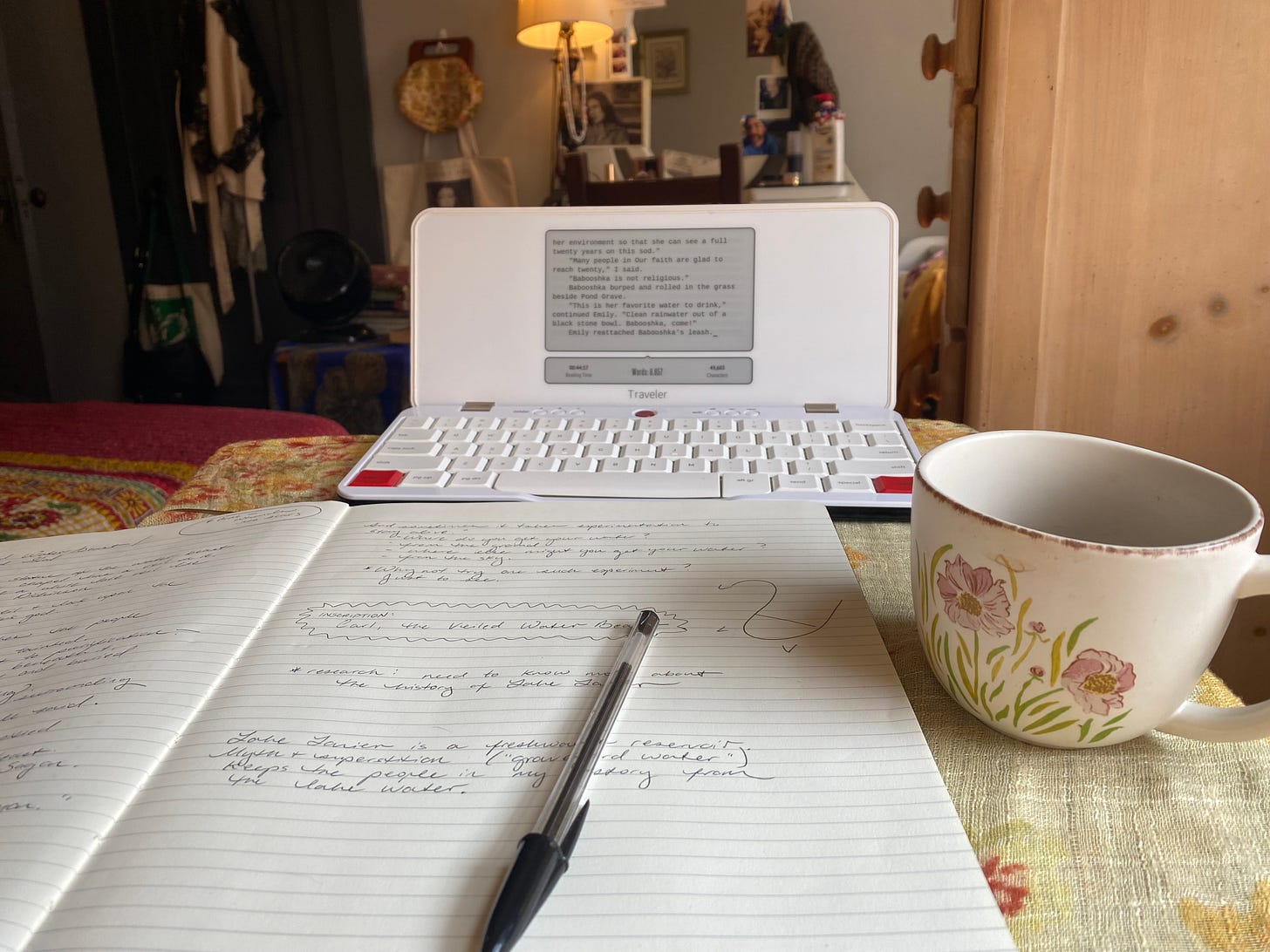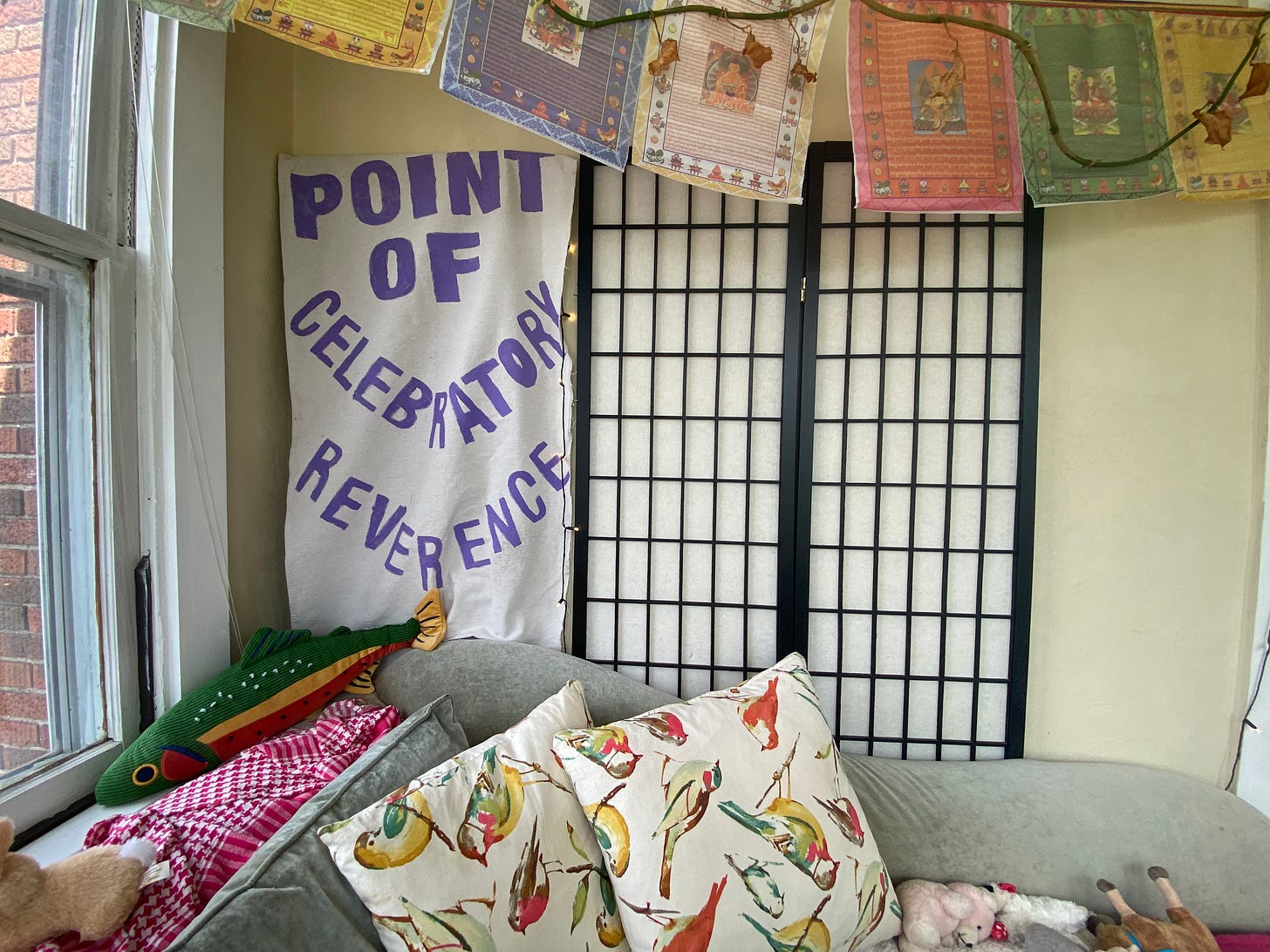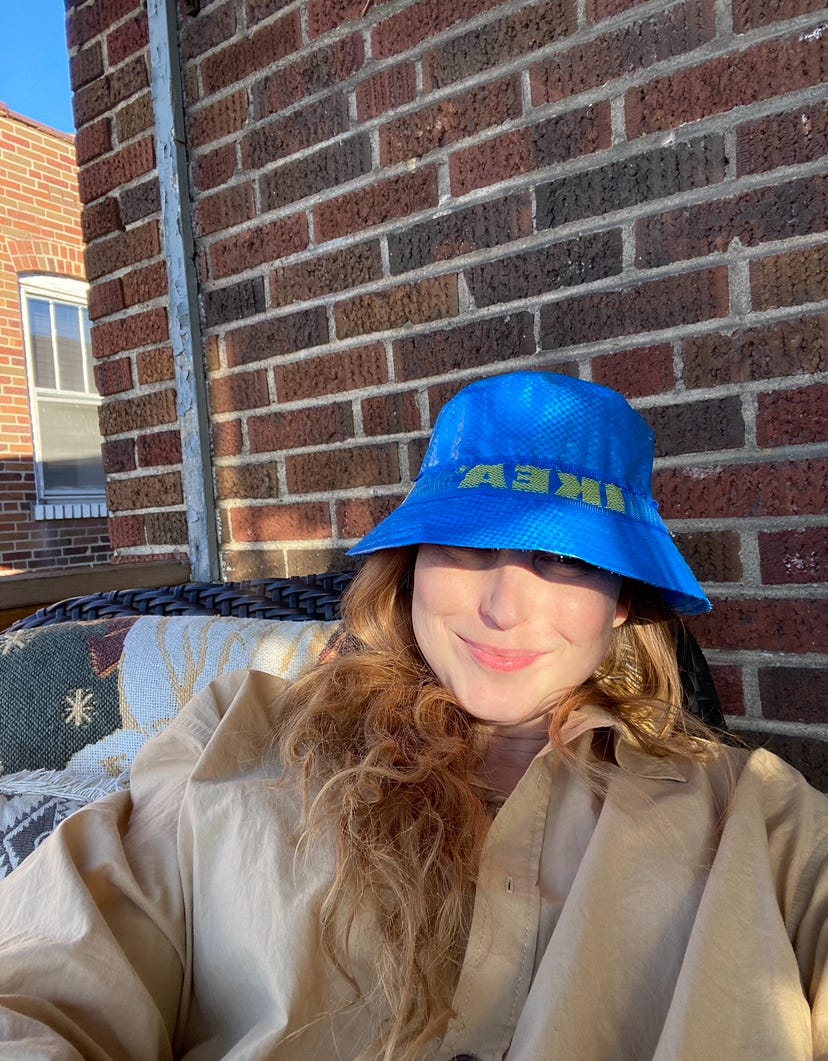Five years of freelancing and the gift I gave myself (spoiler: the gift was time)
Here is a Letter from the Homestead for September. ✍️ Inside: my yearly "State of the Freelancer" reflection.
Emily Dickinson called her Amherst home “The Homestead.” I lovingly call my apartment in St. Louis the same thing (although I definitely get out more than Dickinson). This monthly newsletter is my attempt to work through what it feels like to put down roots as a writer in my own Homestead.
Five years of freelancing.
About once a year in this newsletter, I give myself space to have a “state of the freelancer” reflection. Someone on the internet mentioned that the term “freelance” comes from the Medieval period—this was literally someone with a spare “lance,” as in the weapon. A free-lancer, then, was an errant knight ready to fight for hire. I have a PhD in English Literature but no energy to counteract the truthfulness of this claim. Still, I like it. I am a “lance” for hire. A sword-bearer. A woman with a pretty horse.
When I worked a traditional full-time job, I was mystified by the chunk of money that appeared in my bank account every two weeks. On a 9-month academic contract, it was even more mystifying when the pay arrived in the summertime (i.e., nine months of pay spread out over twelve months). This is not my reality as a freelancer—I work month-to-month, contract-to-contract. I’ve learned how much an hour of my time is truly worth.

In five years of freelancing, I’ve hit some major milestones: sustainable work as a playwright and prison arts educator, only doing work I am interested in, writing two novels, getting a literary agent (finally), and understanding the system of grants and fellowships for my field.
I understand why it took five years to get to place of reasonable stability, but, y’all, I wish it had happened much faster. After going through the whole process of getting a Ph.D. (a crucible in itself), I have sometimes acted like I was entitled to a speedier conclusion of all the hard work. I wanted faster results, bigger milestones, and more productivity. I thought I’d be spared a degree of grunt work because I’d already grunted so long trying to finish a doctoral degree and get myself an academic job.
Reader, I was not spared. It’s been a hard road. May the road be easier for you if you choose such a path.
For my yearly “state of the freelancer” reflection, here are a some fresh things I’ve learned…
Freelancing life is where your ego goes to die. I didn’t realize I had a big ego until I had to stop telling people I was a professor. Regardless of pay and working conditions for academics, there is still prestige in that job title. The name itself implies that you’ve put in your work. My ego had to be buried in a cement grave when I transitioned to freelancing. (People don’t believe you when you say your job is “writer,” you know.) When you are a freelancer, the only things you have to stand on are your reputation, your work, and your integrity. No pedigree can do that work for you.
Freelancing is easier when life is simple. This will be an unpopular reflection, but I’m not sure how I could’ve managed working as a full-time freelancer when I was married and helping support a partner. Because of that relationship, my life was complicated—emotionally unregulated, unpredictable, and tied to the daily rhythms of another person. Because I live alone, am unmarried, and am only responsible for myself, I have much more margin to deal with the ups and downs of working for myself.
You cannot predict how you’ll feel when you wake up. As I get older (helloooo, perimenopause!), I never know how my body will feel on any given morning. Mood swings? I’ve got ‘em. Sore joints and feet? Yes, those too. Total brain fog and existential despair? Happens often. And then there are other days where I wake up with the wild energy of my athletic parents—invincible after a single cup of coffee. This unpredictability is a good lesson for freelancing. When you are the one who must hold yourself accountable, your body will not always be on board with the schedule you’ve planned. And, as you age, you cannot just “push through” like you used to.
You will have to do contract work you don’t like, and you may have to do it for a while. In five years, I’ve done many writing and performing jobs I didn’t love. I’ve been an audiobook narrator, written romance novels, and done instructional design. None of this work resonated with me, but I did it because I had a set of skills that could meet a particular market need, and I needed to get by. If you leave a full-time job to do something completely new (especially if it’s creative), you must be prepared to “get by” for a while. It’s not fun, but there are unexpected rewards. For example, I never would’ve thought myself capable of writing a serious novel and seeking out an agent if I hadn’t written so many romance novels for four cents per word. The “meh” work has its place, and it gives you time to build toward the work you really want to do.
The only way you will be motivated to learn new skills is if you have clear professional or artistic checkpoints you’re working toward. I learned to write a query letter because I knew I needed one to get an agent. Before that, I learned all the industry standards for a literary speculative novel (80,000-95,000 words, good comp titles, a clear pitch, etc.), and wrote for two years to get myself there. Then, I labored in the querying trenches for two more years trying to get an agent—while also writing a second novel if the first one ended up failing. The professional checkpoint was clear: write a novel that can get me an agent. I worked backward from that goal—it was the only way I was motivated to do the self-education I needed.
When you have more hours in your day, your body will tell you what to do with them. Case in point: the second I started giving myself more hours each day, my body wanted rest. After a decade in school and four years on the tenure track, I had a bill of sleep debt that needed to be paid. What’s interesting, though, is my writing output has increased, regardless of how much extra rest I’m getting. I am resting more, but my waking hours that I use for writing time are more robust.
Frugality creates time. When you work less hours than you used to, you get more frugal. And when you spend less money, you have more clarity about what resources you really need. I’ve cut out a lot of noise in my life just by having less money to spend, and this has resulted in more time.
You will get better without realizing it. The more you write (or whatever your thing is), you just get better. Things move to an even stronger level when you learn to self-edit; that’s a frequency that determines the biggest strides in growth. In my five years of figuring out freelancing, I know I’ve become a stronger writer. It’s still hard (because writing is hard), but I’m more willing to sit with a project to the end, whittling through the lead to the real vision.
Things are always cooking, even when it looks like you’re doing nothing. Even on days where I struggle to write a sentence, something happens. I see an image. I imagine a scene. I better understand a character. I make progress on the “thinking” part of writing. My life as a writer never stops—it’s always humming in the background. One example of this is how it took me weeks of low productivity to finally conjure up the central image of my Romanov Family Yard Sale play. It was a parachute, like the ones used in P.E. classes, and it was exactly the image I was looking for. Sometimes, you have to wait for the images to come to you.
You must “fill the vault” every day. This is how you cultivate enthusiasm. It can be small things: a little reading, a little music, a little cooking, a bit of doodling. I do think you have to be conscientious about how you fill the vault. For me, my downfall is Instagram reels—that is not filling the vault (it’s just giving me migraines lol). One of my small things is putting on the soundtracks from the Lord of the Rings movies. Or pulling out my tarot cards and asking for help. Or making up a song about my cat.
You may not be able to live this life if you feel you’re constantly being monitored by someone. Being a freelancer would not work for me if I were living with someone, partner or otherwise. I am a people-pleaser by nature, and I can’t bear to think that anyone might find me “irresponsible.” The trouble is that it’s easy to feel overly-monitored if you have someone in your apartment asking, “What did you accomplish today?” As a freelancer, you won’t always have something conventionally acceptable to say. For me, I have to protect my working and living space to keep this sense of surveillance out of the picture.
The latest lesson? The great gift of freelancing was how it gave me more time. Not time to be “productive,” but more time to exist. When you have time to exist, the work that has been given to you will find its way out eventually.
What I’m reading this month…
The Duty of Delight: The Diaries of Dorothy Day, edited by Robert Ellsberg. I love reading writers’ diaries. This is a wide-spanning collection, covering so many of Day’s years throughout her time at The Catholic Worker.
Lit: a memoir by Mary Karr. I first read this memoir in grad school and have been meaning to come back to it. I listened to the audiobook version (read by Karr) while driving back and forth to the prisons. It’s incredible.
Memoir of a Modernist’s Daughter by Eleanor Munro. This is a random, out-of-print book I found from following a used bookstore on Instagram. Such a fascinating look at the ideology of the mid-twentieth century.
I’m also still slowly plodding through Dante’s Divine Comedy and Eliot’s Middlemarch. I’ll be pleased with myself if I make it through both these books by the end of the year.
How I made money this month $$$
I believe freelance artists should be more upfront about how they support themselves financially, rather than maintaining the illusion they are fully supported by their art (they usually aren’t). This is me attempting to live out that principle. So, here are all the ways I brought in money to the Homestead for the month of September.
Teaching artist work for Prison Performing Arts. Teaching a weekly writing workshop on Zoom and teaching Spoken Word regularly inside a men’s prison.
Text coaching for a local play with lots of Shakespearean verse in it. First time in my life I’ve ever gotten the title of coach!
Volunteer stipend for a queer support helpline. I make a small bit of money each month by working shifts on the St. Louis Queer Support Helpline.
Paid Substack subscriptions. Thank you to all of my paid subscribers. It means the world to me you make a financial contribution to my work.
Meet Old Linus 🐈
I’m taking care of my parents’ very elderly cat, Old Linus. He is eighteen years old and has four teeth. He eats three jars of baby food a day. He is the sweetest cat. (In fact, while finishing up this newsletter, he came to visit me with a throaty meow.)
May we have nice little lives as peaceful and full as Old Linus.
Tonight starts a new month.
Thank you, as always, for reading.
Courtney, Mistress of the Homestead (and Noble Midge and Old Linus 🐈⬛ 🐈 )











